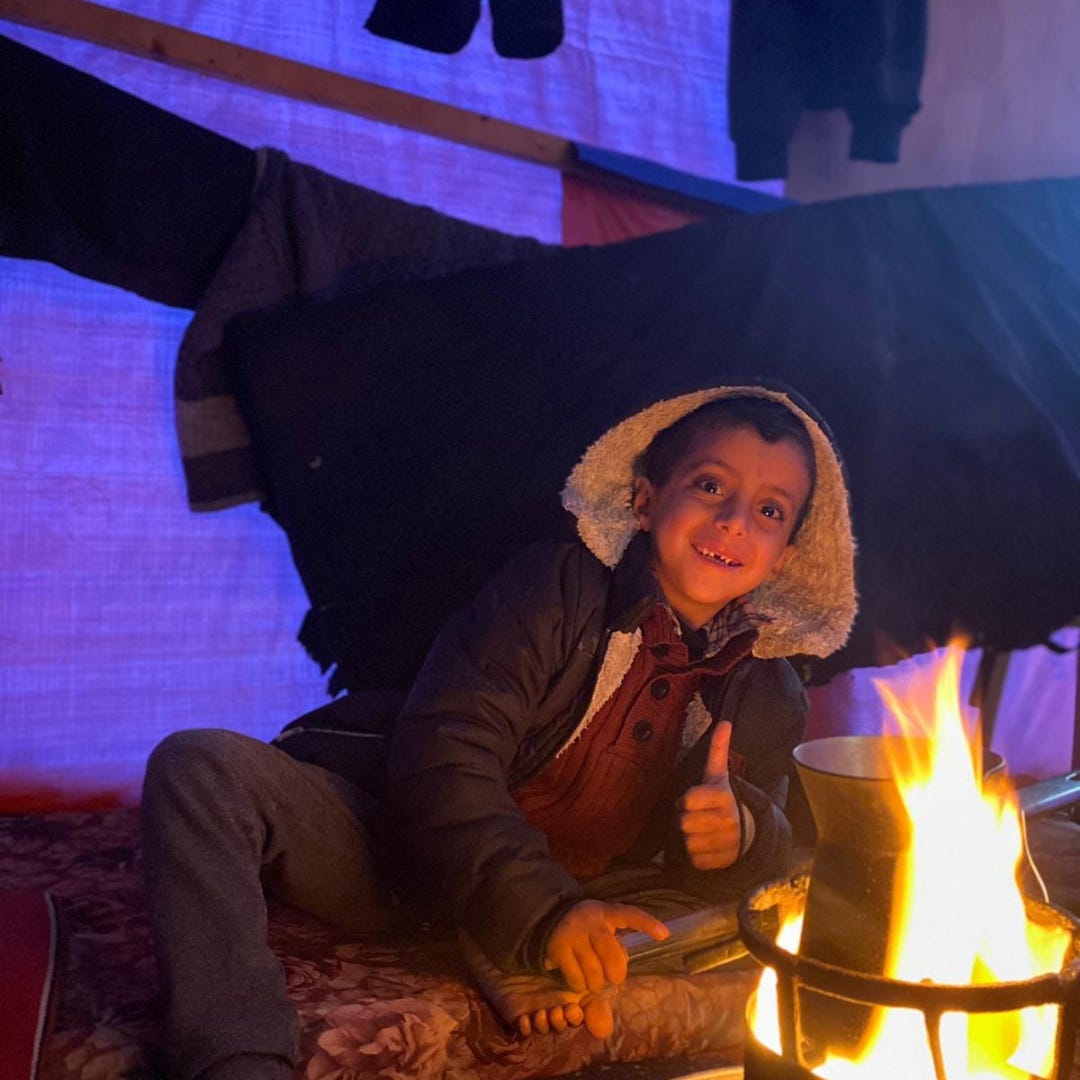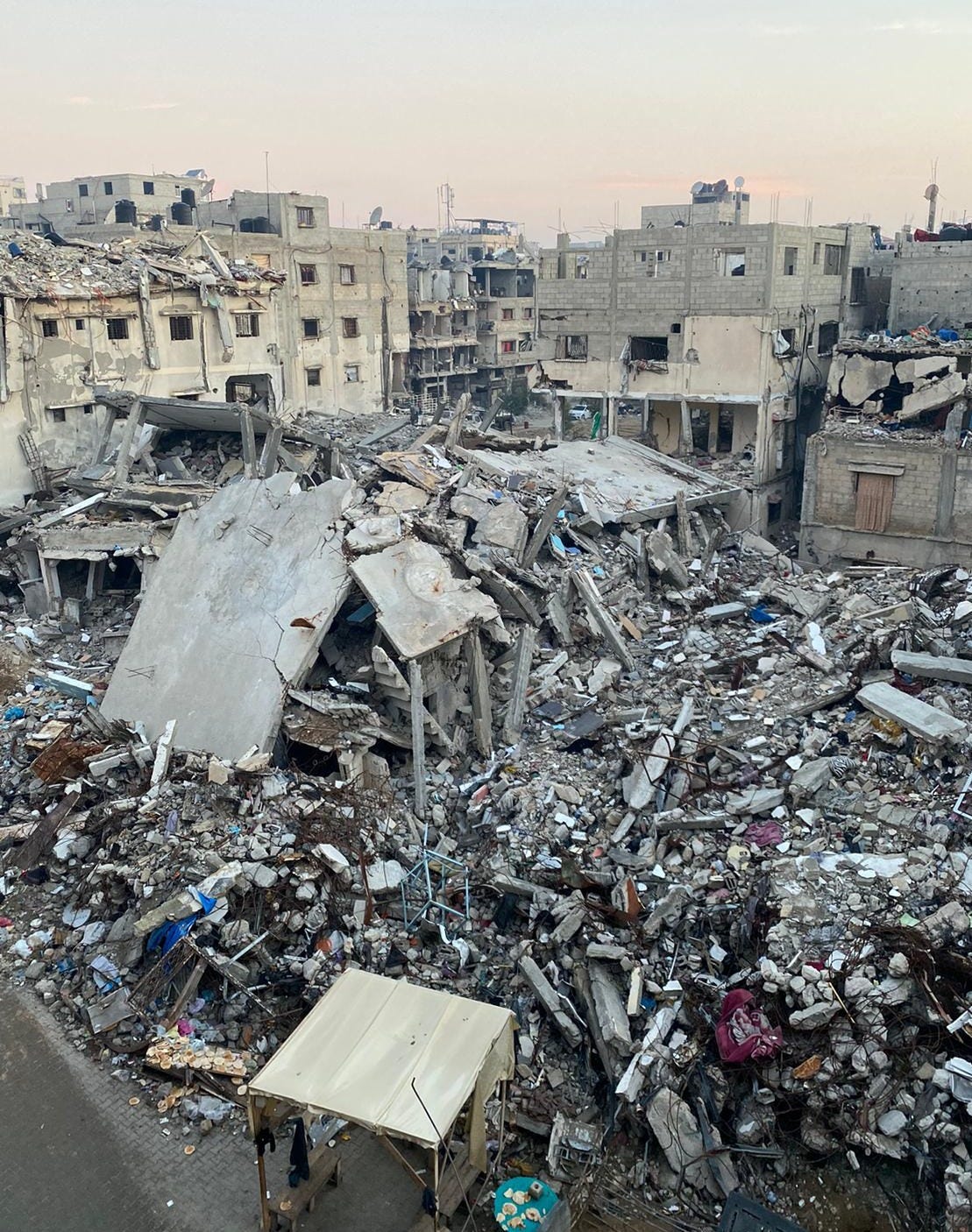Gaza Conversation - Part 6
Back North, friends said they had to eat pigeon feed and corn because there was nothing else to eat. Every time they told me about their suffering, I cried, unable to comprehend what had happened.
These are a series of conversations I have had with people in Gaza, which form part of the book I am writing. Part 6 is still based on conversations with Muhamad Abu Zuheir, 21, who was displaced in Al Mawasi, Khan Younis, Gaza. Muhamad lived with 10 family members in a tent on the beach, including his parents, his younger sister, 7, and his brother, 5. After the ceasefire, Muhamad and his family travelled to the North where they are orginally from.
Winter in Gaza is harsh, compounded by the fact that people live in makeshift tents in Al Mawsi with very little insulation from the elements. Water from the sea has been flooding tents during the day, and taking the lives of infants by night. On the 9th of Jan, the UN reported that ‘Children are now freezing to death’ a situation that could have been prevented if Israeli authorities had allowed much-needed winter supplies to ensure that the lives of people were protected. Since then, a dozen more infants have been reported dead.
Muhamad and I have been talking about how his family copes with the cold. Muhammad told me that: “We used to look forward to the cold in Gaza, the winter was filled with hot drinks and family gatherings over hot food and fun times - Now for the third year, we dread it”. he added: “Because of our situation, people are dying here in winter now” - and I asked him to write me something, he sent this:
Winter in Gaza - Jan 12
We are among the people who feel the cold the most because we lived near the sea, on a barren and uninhabitable land before the war. It was an empty area with no life. At first, we tried to reinforce our tent and get stronger wood. A kind woman helped me buy sturdy wood to rebuild and reinforce the tent. Once we secured it properly after a storm damaged it, the situation improved.
On the first day, it rained, we were completely flooded—it was as if we were sitting out in the street with no shelter to protect us. We all got soaked and really sick. We tried to make some fixes to stop the rain from coming in during the winter. Now, the rain still leaks in, but it’s better than before. We can prevent the water from coming in, but the cold is unbearable, and it’s very hard to stay warm when you are sleeping on sand and the beach. Every night, I barely sleep—I wake up multiple times from the cold, clutching my knees because the cold causes me pain, and I can’t rest.
My mother noticed that I wasn’t sleeping well because she sleeps next to me. She started going to bed early and waking up around 5 a.m. to put her blanket over me so I could warm up and sleep, as we don’t have enough blankets. I cried silently every time she did that so she wouldn’t notice. I cried because I knew she was cold too, yet she gave me her blanket every single night. My mother means everything to me. I pray to God to grant her health and strength so I can make up for the hardships she has endured during the war.
My little brother Mahmoud is about five years old. Every time it rains, he freezes and can’t move, so he sits in my lap to stay warm. We talk a lot. For instance, he often asks me for money to buy things. That’s the one thing he keeps asking me for. Honestly, Mahmoud doesn’t ask anyone but me because I’m the one who provides for the family through the donation link.
We love the rain and winter, but not in the tents. We’d love it if we were in our home, warm, surrounded by our relatives. No matter how much I try to describe the cold we feel, I won’t be able to put it into words. Sometimes, my knees are about to explode from the cold. I’m afraid something will happen to one of my family members because of it, like what has happened to so many others.
I hope everyone who reads this prays for us and spreads our story as much as possible so the world can see the suffering we endure because of the occupation and because of this war.
On the 19th of January, a temporary Ceasefire, brokered by Egypt and Qatar, was announced and people in Gaza rejoiced. Images of Palestinians in Gaza celebrating this news were all over the Media, and there was a sense of hope in the air, and that the war had ended. The celebrations were short-lived, as people realised the task ahead was greater than they thought. But for a fleeting moment I asked Muhammed about his feelings regarding this news and he wasn’t as happy as others, as the psychological trauma of what had happened in the past year started to haunt him. He said, like many others, the family were planning a trip to the North to see what had happened to their house. He wrote this to express his feelings:
The Ceasefire - Feb 2
At first, we were very excited to return to the north to see our friends, loved ones, and the rest of my family who had stayed there.
On January 24th, the army allowed us to return from the south to the north on foot. My family and I—about ten people—walked nearly 15 kilometers. We had a lot of belongings with us, along with children, and my mother was sick and in pain. We reached the north with great difficulty, and when I went to our house, I found it completely destroyed and uninhabitable. Now, we are living in my grandfather’s house.
We had hoped that life in the north would be better when we returned, but we faced many challenges, such as water shortages. The biggest problem, however, is that there are no job opportunities, not even simple ones—meaning there is no source of income for me or my family.
For the past few days, I have been searching for a house to rent at a reasonable price, but unfortunately, rent is very high because there are so few habitable houses and so many people in need of shelter. Housing has become our biggest struggle.
On my first day back in North Gaza, I went to the house where my beloved and her family were martyred. It was destroyed beyond recognition, in a terrible state. Then, I went to our old home and found the entire neighborhood in ruins.
Despite everything, people are happy that the war is over and that they have survived.
I sit with my friends who never left the north and lived through the entire war there. They tell me about the difficult days they endured—how the army besieged and tortured them, how they saw martyrs torn apart into pieces. They told me how they had to eat pigeon feed and corn because there was nothing else to eat. Every time they told me about their suffering, I cried, unable to comprehend what had happened.
But alhamdulillah for everything...
Since then, the ‘supposed’ Ceasefire in Gaza has fallen apart in so many ways, but perhaps the most shocking was the IDF's launching a full-fledged operation of annexation and forced displacement in the West Bank, two days after the Ceasfire on the 21st of Jan 2025. Operation ‘Iron Wall’ was launched, displacing more than 40,000 Palestinians in refugee camps across the West Bank - Benjamin Netanyahu called it a "large-scale and significant military operation". I heard one of my Palestinian colleagues at work say the other day: “If we in the West Bank are being played as a bargaining chip in these negotiations to stop the genocide of our people in Gaza, then let it be that, we are strong and we will fight on their behalf”.
But the genocide and the ethnic cleansing of Palestinians didn’t stop. And in using the exact same tactics as Isreal has done for the past year and a half in Gaza, have now been seamlessly extended to the West Bank.
And while the Arab Leaders, Trump and the rest of Europe hailed a ‘Ceasefire in Gaza’ as a step towards peace, while Isreal continues to get away with its actions, playing the political stage once more, in a bid to continue the killings and forced displacement of the Pelsasinain people. But this time under the guise of peace and the noses of all world leaders.
Since the beginning of the Ceasefire in January, Isreal has violated the terms of the agreement at least 350 times in Gaza. Muhamed sent me a voice note two days ago with warm greetings from North Gaza for the start of the holy month of Ramadan, and the voice of the zananah (IDF’s drones) was clear in the background and quite loud. I asked him about it, and he laughed a little and said, “Yes, they never stopped, they never will. But alhmdulilah for all, we don’t care; we are gearing up for the start of the Holy month, and people are joyful”. The month of Ramadan started on the 1st of March, and on the eve of the very first day of Ramdan, Israel announced blocking the entry of all humanitarian aid into Gaza.
As I watched this unfold on the news last night, a deep unease settled in my gut. I couldn’t say I was surprised—Israel’s history speaks for itself. But at this point, it feels like we’re ALL being played—except, of course, for the Palestinian people, who continue to endure, resist, and confront the relentless atrocities of Israel’s unchecked impunity —just as they have every single day for the past 17 months in Gaza and the past 75 years across all of the Occupied Palestinian Territories.




Thank you for sharing your thoughts, Marwa. This reality is brutal and tragic.